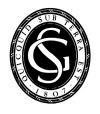The 2016 Lyell meeting – Palaeoinformatics

c. Ulrike Hoff, UiT, the Arctic University of Norway, Tromsø/Dan Sykes, NHM
The Geological Society’s 2016 Lyell Meeting, which takes place on 9 March, will look at palaeoninformatics – the information technology used to manage, preserve and distribute palaeontological data
‘Palaeontological data is our record of life on earth, and of the history of our biosphere’ says University College London’s Dr Jeremy Young, who is co-convening the meeting. ‘Making large scale data available is an opportunity to address wide ranging questions, from investigating large-scale patterns of evolution, to identifying fossils.’
Dr Ken Johnson of the Natural History Museum, who is also convening the conference, describes informatics as the science of keeping data ‘fit for purpose’.
‘Just like physical specimens, if data are left lying around, they gradually degrade. Taxonomic concepts change, stratigraphic interpretations alter, new chronostratigraphies become available, and even place names change. So the information becomes less and less useful without curation by experts.
‘Informatics provides methods for more efficiently curating the data to keep them in good condition, and ready for use to address scientific questions.’
Currently, much of our palaeontological data is held in non digital formats, which presents a challenge. The Natural History Museum, for example, holds tens of millions of fossils, whose data is held mainly in register books, or on labels.
‘We are in the process of developing new high-throughput workflows to capture this information in a digital format’ says Dr Johnson. ‘As this progresses, it provides new opportunities for the data to be improved using informatics – for example by comparing the information with other data sources to identify inconsistencies.’
Many palaeoinformatic projects aim to be open source, in order to democratise access to palaeontological data. It is hoped, for example, that palaeoinformatics will help enable non-specialists without access to journals to identify fossils.
There are also larger commercial projects, such as Neftex, producing large-scale syntheses of stratigraphic data for the hydrocarbon industry. ‘One aim of the meeting’ says Dr Young, ‘is to increase flow of information between academic and commercial users of palaeontological data.’
‘It will bring together leading international workers from across the field, and we hope it will publicise new directions the field is taking, enable interchange of experience between experts and stimulate new participants and collaborations.
Additional meetings taking place at the Natural History Museum and UCL will discuss, among other topics, a new collaborative project between researchers at UCL and the Smithsonian Museum in Washington to produce an open access database of planktonic foraminiferal taxonomy.
‘It is an exciting time’ says Dr Johnson, ‘as we are beginning to realise the potential for the vast amount of information resulting from almost three centuries of collecting and curating fossils.’
Source: http://blog.geolsoc.org.uk/2016/03/03/the-2016-lyell-meeting-palaeoinformatics/
Anyone can join.
Anyone can contribute.
Anyone can become informed about their world.
"United We Stand" Click Here To Create Your Personal Citizen Journalist Account Today, Be Sure To Invite Your Friends.
Before It’s News® is a community of individuals who report on what’s going on around them, from all around the world. Anyone can join. Anyone can contribute. Anyone can become informed about their world. "United We Stand" Click Here To Create Your Personal Citizen Journalist Account Today, Be Sure To Invite Your Friends.
LION'S MANE PRODUCT
Try Our Lion’s Mane WHOLE MIND Nootropic Blend 60 Capsules
Mushrooms are having a moment. One fabulous fungus in particular, lion’s mane, may help improve memory, depression and anxiety symptoms. They are also an excellent source of nutrients that show promise as a therapy for dementia, and other neurodegenerative diseases. If you’re living with anxiety or depression, you may be curious about all the therapy options out there — including the natural ones.Our Lion’s Mane WHOLE MIND Nootropic Blend has been formulated to utilize the potency of Lion’s mane but also include the benefits of four other Highly Beneficial Mushrooms. Synergistically, they work together to Build your health through improving cognitive function and immunity regardless of your age. Our Nootropic not only improves your Cognitive Function and Activates your Immune System, but it benefits growth of Essential Gut Flora, further enhancing your Vitality.
Our Formula includes: Lion’s Mane Mushrooms which Increase Brain Power through nerve growth, lessen anxiety, reduce depression, and improve concentration. Its an excellent adaptogen, promotes sleep and improves immunity. Shiitake Mushrooms which Fight cancer cells and infectious disease, boost the immune system, promotes brain function, and serves as a source of B vitamins. Maitake Mushrooms which regulate blood sugar levels of diabetics, reduce hypertension and boosts the immune system. Reishi Mushrooms which Fight inflammation, liver disease, fatigue, tumor growth and cancer. They Improve skin disorders and soothes digestive problems, stomach ulcers and leaky gut syndrome. Chaga Mushrooms which have anti-aging effects, boost immune function, improve stamina and athletic performance, even act as a natural aphrodisiac, fighting diabetes and improving liver function. Try Our Lion’s Mane WHOLE MIND Nootropic Blend 60 Capsules Today. Be 100% Satisfied or Receive a Full Money Back Guarantee. Order Yours Today by Following This Link.






